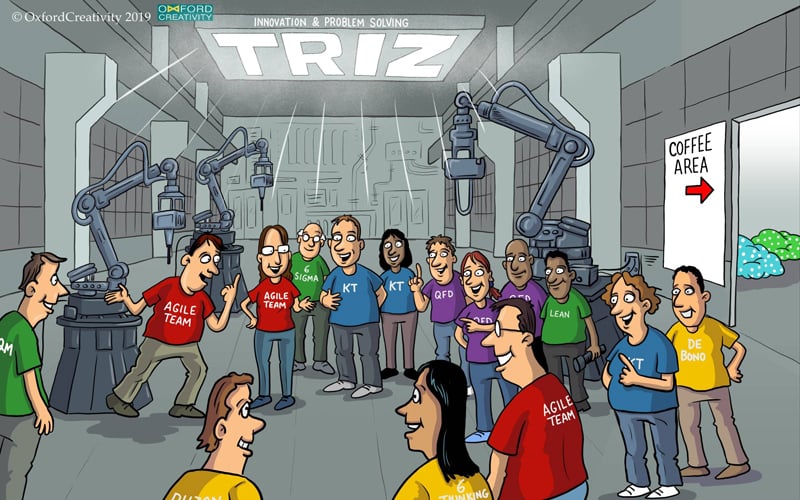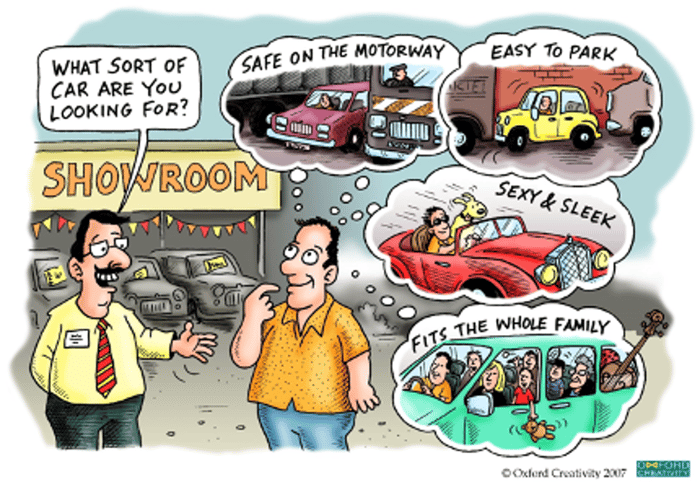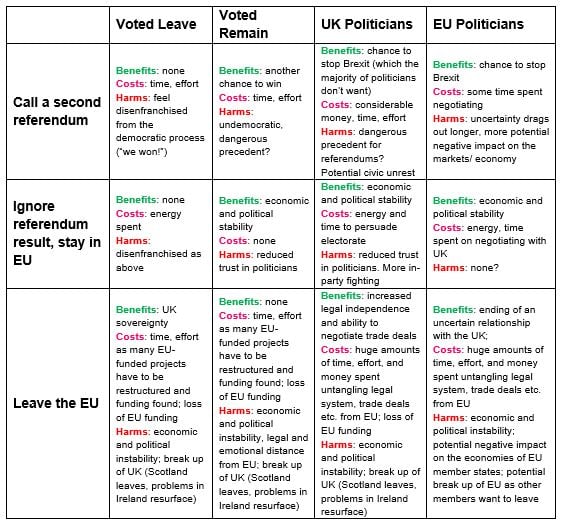Can we solve the contradiction of leaving and not leaving?
It’s a terrifying time to be British.History was made on 23 June 2016 as the referendum on Britian leaving the European Union (EU) returned a majority vote for leaving. Many people - myself included – didn’t think this result was possible. And judging from the total lack of a plan, even the people campaigned for “leave” didn’t believe it was going to happen either.
And now we are two weeks away from leaving with no exit strategy in place.

So what do we do now? And can TRIZ help?
One of the things I’ve always said about TRIZ is that it is superbly logical and doesn’t allow for emotion. This is both true and not true. TRIZ will suggest classes of solutions based on logical processes, and therefore will suggest solutions which could be rejected for emotional or even moral reasons.
For instance, if you are a manager looking at reducing costs, suggestions will include removing staff which you may be unwilling or unable to do for emotional, legal or moral reasons.
However, it can be incredibly useful to take a logical approach to solving problems which include high levels of emotion, complexity and uncertainty – partly because when you are feeling emotional it can make decision-making and planning even harder.
At a time like this, when the world feels highly unstable and the right future direction unknown, a systematic framework for your thinking can be not only practically helpful but also comforting.
This issue is one which is highly emotional and this must be acknowledged by both sides of the debate. I was born a European and I feel a deep sense of grief at the idea of taking a step away from people I regard as my neighbours and friends on the continent. We have been part of a team in the EU – the EU isn’t perfect but I’d rather fix it than leave.
I am not the only one that feels this way, and I have read a lot of angry responses to the referendum result on social media from others who voted to remain in the EU which has painted the people who voted to leave as racist and ignorant, characterising their decision-making process for choosing “leave” as emotional and illogical.
This is not helpful: there are many logical and practical reasons why people would want to vote to leave, such as frustration with the bureaucracy and waste, worry over the practical impacts of free movement of people such as planning healthcare, housing and other infrastructure needs.
However the practical implications of leaving or staying has seemed impossible for most people to predict, and emotional responses have been deliberately stirred up by both sides.
Emotions are not "noise" which interferes with practical and logical problem solving: they can be a useful source of information both in understanding yourself and in understanding other people.
People's emotions are not “wrong” and if someone is angry, afraid and upset about immigration (for example) the fact that you find their emotion distasteful doesn’t make their feeling any less real, and you can’t ignore it and hope it will go away, or worse think you can fix it and change them.

Intelligent problem solvers acknowledge emotions and have a plan to deal with it, as a side-note, psychologists work on the assumption that people feel emotions for a reason at some level: even if that reason is based on fear or anxiety. Understanding the reason for someone’s emotions helps you understand them predict future behaviours and possibly help people to change.
It is essential therefore to understand when emotions are giving you a useful signal and when they are not. I am furious that Boris Johnson, Nigel Farage and Michael Gove stirred up so much fear and anger about immigration that there has been a sudden and immediate surge of hate crimes and open racism across the UK.
The Leave campaign lied – they claimed that this solution would deliver the benefits of increased spending on the NHS and reduce immigration. Within 24 hours the Leave campaign backtracked on the “additional £350m a week for the NHS” claim and immigration levels are likely to go unchanged. That anger is worth listening to: anger can be a reaction to injustice and spur you to useful action to right it.
Head in the Clouds and Feet on the Ground
I heard a lovely phrase on a workshop once: someone said they like to “keep their head in the clouds and their feet on the ground”. This is one of the things TRIZ helps you do: you think big, you dare to dream the impossible, and you also deal with reality in a highly pragmatic and practical way. It’s just a contradiction!
Trying to untangle this issue and see a route forward reminds me of the famous joke about someone asking for directions and being told “Well, I wouldn’t start from here”. And you know, I wouldn’t. But here we are…and someone has to come up with a plan for what do to next.
There’s no point me developing a plan (as I can’t implement anything) but I can suggest how TRIZ could help shape decision-makers’ thinking - and if you’re reading this – call me! I can help!

How did we get here?
In order to understand why people might have voted “leave”, it’s worthwhile thinking about what they were hoping to achieve as a result. This campaign was not about Europe for many people, but became a lightning rod for many other issues.
One of the key parts of the Ideal Outcome is understanding the difference between benefits, needs and solutions.
- Benefits are outcomes that we need or desire. They contain no definition or description of how we get what we want – they are just the outcomes.
- Needs are just what they sound like – something we want.
- Solutions – how we get what we want. Solutions deliver benefits which meet our needs.
Problem solving is just a matter of finding the right solutions to meet needs.
To do this you need to understand everyone’s needs – all of them – in order to find the right solution.
I think the problem we have now is we might have the wrong, simple solution (leaving Europe) to some very real, complex problems. Did every person who voted to leave really want to leave the European Union…or were they hoping for more - more funding for a cash-strapped NHS, more primary school places, more jobs, more affordable homes?
Similarly, did everyone who voted to remain actually want to remain part of the European Union, or were they voting for something else – like maintaining the status quo (no matter how broken) in an uncertain world?
In order to move forward in the right direction, we have to understand what people want and where these needs are not being met to uncover all problems – and choose the option that delivers the most positive outcomes to the most people.
I first wrote about this in 2016, just after the results, the fact that we have still not got an exit deal shows just how difficult meeting both sides needs is - they obviously didn't take my advice at the time!
Ideal Outcome
The Ideal Outcome is a TRIZ thinking tool for helping to capture all needs. By imagining what we would get in a perfect world, we are able to lift our heads; we look beyond what we think is possible to uncover everything we really, really want (even if we never expect to get it).

The Ideal Outcome is our North Star: we never expect to get there, but we use it to make sure we are headed in the right direction.
What would be the Ideal Outcome for this current situation? Something perhaps like:
- Everyone is happy with the chosen direction forward (people who voted leave, and those who voted remain, politicians, the rest of Europe, the rest of the world)
- Nothing gets worse or is returned to the state it was in before the referendum (e.g. trade, the value of the pound, the NHS etc)
- Change happens instantaneously - to avoid any more time and money being wasted
One of the TRIZ mantras is that somehow you get everything you want and nothing changes. This would be particularly useful here.
This would suggest that somehow we leave and don’t leave. I know this sounds spectacularly mad but stay with me….perhaps there is some kind of solution where everyone gets everything that they want.
In order to understand this we should do the Ideal Outcome from different perspectives: this will highlight any conflicts or contradictions between what different groups of people have. And when you have uncovered a contradiction, you can start looking at solving it.
We should consider what perspectives we need to consider – who are all the stakeholders in this situation? An initial list might be:
- UK citizens (living in the UK and in the EU)
- EU citizens (living in the UK and in the EU)
- Irish Citizens (living in Northern Ireland and Ireland)
- UK politicians
- Irish politicians
- EU politicians - considered both as a body representing the EU and also as politicians from individual countries e.g. France, Germany, Belgium, Netherlands, Greece etc.
- Citizens and politicians from countries which want to join the EU
- UK businesses
- EU businesses
- Banks
You could then start listing out the Ideal Outcome for each of these groups (ask them). Some groups would benefit from being broken down – for example we could look at the citizens of the UK either by how they voted, how they would vote now, or by demographic.
We might find there are many contradictions that exist between what different people want – and you might find some surprising similarities and much shared common ground.
At the very least, by understanding the needs of every stakeholder in this situation we will be able to make sensible choices between options. If you make a choice which privileges one group over another, you are doing it with your eyes open, and you can potentially ameliorate some of the downsides.
Once we have done this, we can evaluate all solutions or directions forward according to their Ideality.
Ideality
When evaluating solutions, many people like to list out what’s good and bad about them. Considering Ideality is a more precise way of not only understanding both the positives and the negatives of solutions but also gives suggestions on how they can be improved.
Ideality is the ratio between all the benefits a solution gives you, compared to its costs and harms.
- Benefits are the outcomes we want, without any description of how we get them
- Costs are all the inputs required: money but also time, effort and resources
- Harms are all the unwanted outputs from our solution: actively harmful things but also risk
This method of comparing solutions provides a structured, logical and relatively objective way of comparing often very different solutions.
The Ideality of different routes forward?
Various next steps have been suggested, and in order to decide what to next we should consider Ideality – from the perspective of different stakeholders. One of the most distressing aspects of this result is the feeling that the people who voted “Leave” and those who voted “Remain” want very different things. It is worthwhile, therefore, considering them separately.
Here’s my first attempt to evaluate the Ideality of 3 potential future directions forward according to the Ideality of different stakeholders (I have just picked 4). I wrote this in 2016, however it is (worryingly) still relevant now.

This is only a first and naïve attempt from someone who is not in possession of all the facts. What we need is for the experts with the relevant knowledge to apply the TRIZ processes outlined above in order to find and uncover the real facts: identify the benefits for each stakeholder in this process, and then evaluate the Ideality of all potential routes forward.
What this will do is highlight any contradictions – which we can then tackle using TRIZ. This is the highest level of problem solving – if the contradictions prove impossible to resolve we can look at reducing costs and harms, first by completing a Function Analysis of the potential solutions in more detail.
TRIZ Function Analysis is a powerful tool for modelling problems, taking often highly complex situations and breaking them down into a series of interconnected binary relationships. Once a Function Analysis has been completed you have a clear definition of the problem which can often be understood at a glance: and then you have the ability to start improving the system by applying the TRIZ Standard Solutions.
What we need for these next steps is the right expert knowledge to be applied in the most efficient, effective way. One of the great joys of TRIZ is that it helps you think more clearly and get to the heart of complex issues – and fast. A Function Analysis need only take an hour to complete but can provide enormous clarity of thought.
These processes will help with the planning of the process of extricating ourselves from the EU, highlighting potential problems before they occur and suggesting inventive solutions.
TRIZ and the right team can find the best way forward for this problem. One of the reasons decisions are hard to make is that all the potential solutions are bad.
There might be a clever, elegant solution out there if we start tackling the contradictions, that makes many people happen – but we won’t know unless we look for it.
[This blog post reflects my own personal opinions and does not reflect the views of Oxford Creativity as a company or any other members of the team. I fully respect the views of each side of the debate, and apologise if any offence has been caused by this post. I welcome any comments, suggestions or alternative approaches]





